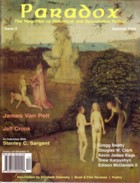"An Endless Array of Broken Men" by Edison McDaniels II
"The Stones of Stupidity and Deceit" by Greg Beatty
"Long Pilgrimage Home" by Jeff Crook
"Sacrifice" by James Van Pelt
"Study of the Regular Division of a Plane with Reptiles" by Kevin James Kage
"The Coming of Merlin" by Douglas W. Clark
"Paradise Lost" by Drew Karpyshyn
 This issue of Paradox opens with Edison McDaniels II writing a story set during the American Civil War, "An Endless Array of Broken Men." The story opens with a graphic description of an amputation in a field hospital and then settles down to examine Dr. Josiah Boyd's reaction to the butchery he is forced to perform in an attempt to save the lives of the wounded. The story has a visceral pull which its placement at the beginning of the magazine allows to dissipate by the time the reader has finished Paradox #2.
This issue of Paradox opens with Edison McDaniels II writing a story set during the American Civil War, "An Endless Array of Broken Men." The story opens with a graphic description of an amputation in a field hospital and then settles down to examine Dr. Josiah Boyd's reaction to the butchery he is forced to perform in an attempt to save the lives of the wounded. The story has a visceral pull which its placement at the beginning of the magazine allows to dissipate by the time the reader has finished Paradox #2.
Greg Beatty posits a strange biological cause of stupidity and deceit in "The Stones of Stupidity and Deceit." Set during the Renaissance in Florence, it tries to push allegory a little too far in a story of Bernardo Machiavelli's decision to exorcise his son of stupidity, but not of deceit. The story is interesting but predictable, and loses its impact in not being based in any sort of biological reality. It is, however, reminiscent of Richard Garfinkle's novel Celestial Matters or Ted Chiang's "Seventy-Two Letters" in its use of non-Western scientific theories, but at only one page, Beatty doesn't have the time to fully develop his background.
Jeff Crook tells a story of two Knights Templar in "Long Pilgrimage Home." Although the story itself is well crafted, throughout there are niggling issues which detract from Crook's tale. The familiarity of nicknames is jarring in the context and, added to the modernity of the characters, tends to drop the reader out of the story. One particularly telling line is that phrase "despite his only being a priest. . ." as thought by another priest, a sense of impersonal humility which would not have been argued by a priest in the fourteenth century.
James Van Pelt gives away a little too much with the title of his story, "Sacrifice." Although the tale isn't as telegraphed as it could have been, Van Pelt does adhere to certain traditions which make it easy to figure out the outcome. That said, he hints at a well defined and different culture which could interestingly be explored at greater length. The reader does, however, have to wonder at the editor's decision to include the story in Paradox, because, while a good story and well-written, it does not seem to have the temporal underpinnings which the magazine espouses.
Kevin James Kage focuses his story, "Study of the Regular Division of a Plane with Reptiles," on the surrealist artist M.C. Escher. Just as surrealist as an Escher painting, the story is made up of a dialogue between Escher and a talking Gila Monster. The specific details of the story are unimportant as it is an examination of the trading in of one muse for another as Escher meets Jetta Umiker, who would eventually become his wife. For all its strangeness, there is an underlining nostalgia and romance in the story which makes it work on a nice emotional level.
Douglas W. Clark returns to the writings of Geoffrey of Monmouth for his tale of "The Coming of Merlin." In this story, Clark focuses his attention on the young Ambrosius Merlin who knows little of magic, rather than the wizened sage often seen in the Arthurian saga. Clark follows Merlin and Bleis, his teacher, as Merlin learns the importance of communication in magic and incorporates the magic of music into his life, and eventually learns to make the magic do what he wishes. Clark's story is not just influenced by Geoffrey's writings, for the scene in which Bleis finally teaches Merlin the importance of communications is reflective of a similar scene between Merlin and Wart in Walt Disney's "The Sword and the Stone."
In the beginning is a Luddite story of that which man was not meant to know. Drew Karpyshyn has taken the traditional story of Adam and Eve's expulsion from the Garden of Eden and turned it on its head in "Paradise Lost," a short story which confounds initial expectations and presents an interesting view of the quest for knowledge. In only a page, Karpyshyn has produced a strong story with a unique interpretation of one of the Bible's oldest tales.